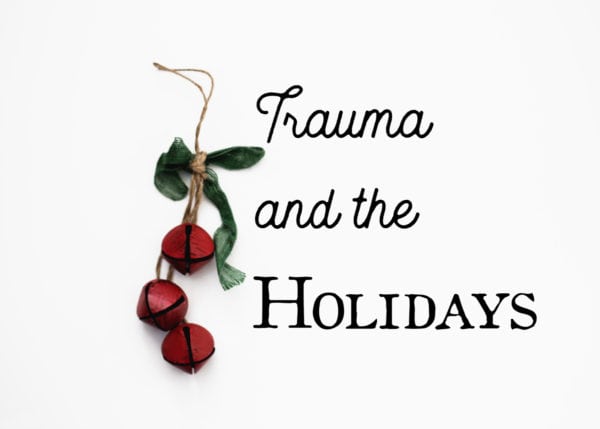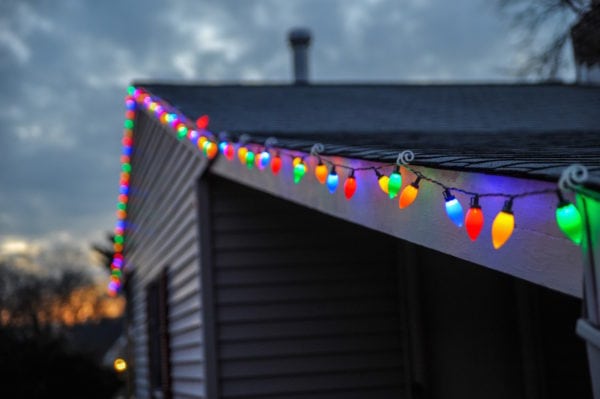The holidays are the most wonderful time of the year, right? But with a child who has experienced trauma, the holidays can be everything except wonderful.
This month we are focusing on the impact of trauma and how it can be exacerbated by the chaos and busyness of the holiday season. It is our hope that, through this series, you’ll be better prepared to help your child face the holidays this year and, in turn, this season will be a bit more wonderful for everyone.

It is almost that time of year! The time where we spend time with family and celebrate. Words that may describe the holidays for us include: fun, excitement, gatherings, food, sweets, gifts, activities, and joy.
Our newly (or even not so newly) adopted kiddos may have a different response. A triggered trauma response.

To help our beloved kiddos navigate this time of year, I have come up with five common trigger categories and tips to navigate them.
(Some of them overlap, and the tips could probably be listed in all five, so keep that in mind.)
1. Anniversary dates.
This one may not apply to all kiddos, but for those of us lucky to have trauma-versary dates during the holidays, it can take some extra care. Be mindful of these dates and follow your child’s lead about celebrating things like family day.
Do not be scared to bring up the dates and help them name their feelings. Remember the body keeps the score and helping them put words to why they are feeling off can be helpful.
2. Lack of felt-safety.
Many times, during the holidays we and our kids are in new situations that can be stressful. New places, new people, new foods. The big tip for this one is to prepare ahead. Talk at length about expectations, including where you are going, how long you will be there, what to expect activity wise etc. Role playing ahead or providing a story timeline will help some kids. Make sure to keep the kids hydrated and fed, and I always bring a few snacks they like if I am unsure of the menu.
3. Unpredictability.
Every year it seems like something comes up and we must change our plans. This can be very triggering and put our kids in a tailspin. Transitions are hard for most kids anyway, adding in the holidays takes it to the next level.
Try to minimize sudden transitions. We give lots of warnings about time in our house such as, “After we decorate this one last cookie we need to go home.”
Using visual aids can also be helpful for this. Keeping a normal schedule as much as possible between the holiday craziness is key.
4. Displacement.
Going out of town for the holiday? Or having family come stay with you? This can make our kids feel displaced. Keeping the same bedtime routine, lovies, etc. is helpful. If they are giving up their room to guests, help them establish their own space wherever they will be sleeping.
5. Overstimulation.
I don’t know about you, but my kids never get overstimulated (kidding!). The main tip for this is to prioritize gatherings and limit them. We only do one extra a week at the most.
Tips for this one are to use one (or more) of the following scripts:
“We can’t this year.”
“Thanks for thinking of us but we won’t be able to.”
“Maybe next year.”
“Nope.”
“No way!”
“Are you nutso? My kiddo would melt down in the first 38 seconds.”
OK, maybe not the last few, but you get the idea. I am giving you permission to say no to all the things. You will thank me January 2nd.

There are also some general tips that will help overall.
1. Prep your friends and family or avoid interactions with those who don’t understand.
Our family does not live close, but we are thankful that they understand and support us. Last year we met them for Thanksgiving (my awesome mother-in-law rented a house about halfway between us all and invited us and my brother in law’s family). The kids had a blast spending time with their grandparents and cousins. We were not overly stressed about the trip because we knew they would all be supportive, and they were. Of course, we had several trauma incidents, including one at 3AM that probably woke the whole house, but we got kindness and no weirdness from our family.
2. Make sure your kids eat right, get enough sleep and spend time playing during the holiday season.
Extra sugar, less exercise and less sleep is never a good outcome in our house. We prioritize regular bedtimes and big muscle movements as a prevention measure.
3. Plan ahead for emotional emergencies and have an escape route.
For outings that made it to your priority list, I have a few suggestions. If your kiddo is old enough, come up with a code word that means “I am feeling overwhelmed” or “I need you”. Your kid can use this word, and then you can go talk privately and figure out the next step. Maybe they need food or drink or five minutes of quiet.
Also, we will take two cars to some events if we feel like one of ours won’t make it the whole time. This gives us a way to take home the kid(s) that are done but allow the others to stay.
4. Do not ignore the sensory diet during the holidays.
This is easy to let fall away, but keeping our kids regulated with their needed sensory diet should be on the important list.
5. Plan for the worst and hope for the best.

As an example for all the above recommendations, I would like to share about my husband’s annual holiday work party…
This is a party with hundreds in attendance, kids invited. I will share Best Case, Worst Case, and how we prep. This year, we will have a brand new 2.5-year-old in our family – we expect to travel to China mid-November. She is our fifth kiddo, and third from China to give background.
Best Case:
The kids all get dressed in their holiday outfits after school with glee and happiness. Everyone’s socks are right, there are no scratchy tags, and everyone is happy to get dressed up. Our new kiddo is on her way to attachment, and happily goes with the flow.
(Hey, I said best case, so I am going all in).
We arrive at the party and the kids wait patiently to see Santa and get their gift. They all smile nicely for the picture, and no one fears Santa. They love the gift they each received. We move on to the food, and the children try all the new things and decide they love baked brie. There is no complaining and they say it is the best food ever.
Along the way we all great hubby’s coworkers with happiness and cheer. The kids do not say it is “boring” or “can we leave yet?” When it is time to go, everyone leaves nicely, and all go to bed easily, not affected by the extra sugar at all.
Worst case:
The clothes are scratchy and wrong. One kiddo will only wear a Spiderman shirt, dirty shorts and crocs (even though it is snowing). We arrive late and frazzled. Our new kiddo immediately melts down because she is overwhelmed.
We see Santa. Two kids cry. One tries to escape, knocking down the 40 foot Christmas tree in the process. They tell the elf giving the gifts that the gifts are awful. They refuse to eat the food, except for the cookies and hot cocoa. They refuse to say hi to anyone.
When it is time to leave, they decide now its fun, and pitch a tantrum in the middle of the floor. They stay up until 1am because of the healthy dinner of cookies and cocoa. This bleeds into the next day.
What we are planning:
I give the kids choices in their outfits, and make sure the correct socks are clean. I feed the kids ahead of time, and make sure the meal contains protein.
We will take two cars in case of a trauma reaction.
I plan to wear our newest and know that she will probably avoid Santa and not be in the picture. That is ok.
I try to find a few things with protein for each kid in the food line. We will leave early. We will have no plans except to stay home the day after for recovery.

When considering what to add to our calendar during the holiday season, one thing I always ask myself is, “Does this activity further the vision and purpose of the holidays for our family?”
Remember that it is ok to say no. Less is more. If it is not fun for most of you – don’t do it.
Most regrets occur because of over-doing it, not under-doing it.
Happy Holidays, friends.
– guest post by Kathy

























Those cupcakes are so cute.